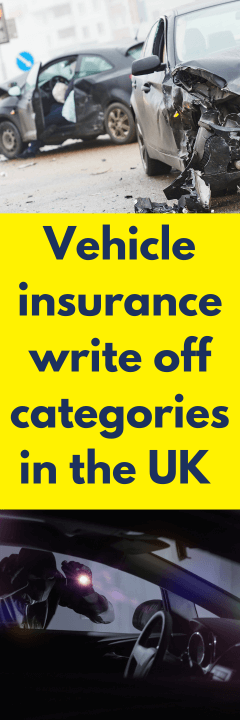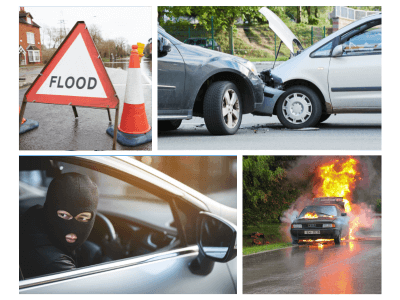Call Monday-Friday 9am - 6pm Closed Saturday & Sunday
Please select some policies.



Need Help? Calling from a mobile please call 0151 647 7556
0800 195 4926 / 0151 647 7556Do you have a question? or need help?
Call Monday-Friday 9am - 6pm Closed Saturday & Sunday,
It is a nightmare scenario for any vehicle owner. Your vehicle has been stolen or involved in an accident, fire or flood, and your motor insurer has the car to assess.
The terms of fully comprehensive cover mean your car insurance company has a few options to consider.
They can repair and return the vehicle to you.
They can replace the vehicle.
They can write the vehicle off as a total loss.
A vehicle write-off is a car that's been damaged to the point where it's either:
Unsafe to put back on the road or
Compared to the car's value, the cost of repairs is so high that it is uneconomic to repair.
The decision as to the fate of your car comes down to your car insurance company. When you make an insurance claim, then they will assess the vehicle. They will determine the car's current market value and calculate repair costs. The ratio between the two figures will decide whether they write off the vehicle as a total loss.
It's not always a death sentence for your car; it's more of an economic decision based on the repair-to-value ratio. Whilst some vehicles are so heavily damaged, it would be unsafe to put them back on the road; others have more superficial damage.
To clarify the severity of the damage to the vehicle, car insurance companies will designate a write-off category to the claim.
In the UK, the severity of a car insurance write-off is signified by designating it with one of four insurance write-off categories: A, B, S, and N. 
Category A: Of all the categories of write-offs, Category A is the most severe. Cars in this category have suffered significant damage to the point they're beyond repair. For example, this could include serious structural damage. The entire vehicle must be crushed, regardless of the car's value, with no parts being re-used.
Category B: These vehicles have suffered serious damage, often to the structural frame of the car. While Cat B cars can't return to the road, some parts that haven't been damaged can be salvaged and used in other vehicles. It's a bit like organ donation for cars.
Category S (formerly Category C): These vehicles have suffered structural damage, like a bent or twisted chassis, but can be repaired and re-registered. However, the repair cost is more than the vehicle's pre-accident value. So it represents something that is not an economical repair.
The motor insurer still deems the vehicle a write-off, but the Cat S vehicle can return to the road.
Category N (formerly Category D): Cat N vehicles haven't sustained structural damage, but other safety-related parts may need repair, such as steering, airbags or braking systems. In other words, just minor damage.
Like Category S, the repair costs exceed the vehicle's value. But with a bit of TLC, a Cat N written-off car can be back on the road in no time.
The insurance company typically offers a cash payout if your car is written off. This will be equivalent to the current market value of your vehicle before the accident. If you owe money to a finance or leasing company, this will typically be paid first.
You also have the option to retain the salvage of the vehicle, mainly if it falls under Category S or N, and arrange for repairs yourself. A salvage value will be calculated, and this figure will be deducted from the write-off settlement made to you..png)
Purchasing a written-off vehicle can be a cheap way to own a car, especially if it's a Category S or N vehicle. However, it's crucial to thoroughly check the vehicle's past, including its insurance category.
Remember, Category S and N vehicles can be repaired. Cat S cars must be re-registered with the DVLA if you decide to repair one. Cat N vehicles do not need re-registering.
1. Understanding Write-Offs: A vehicle write-off is a term used when a car has been damaged to the point where it's either:
unsafe to drive or
the cost of repairs exceeds the vehicle's value.
It's an economic decision made by insurance companies based on the repair-to-value ratio or where it is not safe to repair.
2. Write-Off Categories: In the UK, a written-off car is classified into four categories: A, B, S, and N. These categories help to determine the fate of the vehicle after it's been written off, ranging from being entirely crushed (Category A) to being repairable with non-structural damage (Category N).
3. Insurance Process: When a car is involved in an accident, an insurance assessor evaluates the damage. If the cost of repairs is higher than the vehicle's market value, or it is not safe to repair, the insurance company will declare the car a 'total loss' or a write-off.
4. Post Write-Off Options: If your car is written off, the insurance company typically offers a cash payout equivalent to the current market value of your vehicle before the accident. You also have the option to retain the salvage of the car, mainly if it falls under Category S or N, and arrange for repairs yourself.
5. Buying a Written-Off Vehicle: Purchasing a written-off vehicle, especially a Category S or N vehicle, can be a cheap way to own a car. However, it's crucial to thoroughly check the vehicle's past, including its insurance category.
Understanding vehicle write-off categories is crucial for any car owner or potential buyer.
The categorisation of your vehicle is determined by a qualified insurance assessor based on the extent of the damage. If you believe an error has occurred, you should contact your insurance company directly to discuss your concerns.
However, it's important to note that these professionals have extensive training and experience in assessing vehicle damage. It may be unlikely that an insurance company would change their mind.
No, Category A and B vehicles are deemed too damaged to return to the road. Category A cars must be crushed entirely, while parts from Category B vehicles can be salvaged and used in other cars. Selling these vehicles is illegal.
Having a write-off claim on your insurance history can increase your future premiums. This is because insurers may consider you a higher risk. However, the impact on your premium can vary depending on the accident details and your overall driving record.
Yes, in some cases, you can buy back your written-off vehicle from the insurance company, particularly if it's a Category S or N vehicle. However, if the vehicle is a Cat S recording, you'll need to re-register the car with the DVLA.
The pre-accident value, also known as the market value, is determined based on the make, model, age, mileage, and condition of your vehicle before the accident. Insurers typically use industry guides (like Glass’ Guide) and databases to calculate this value.
If your vehicle is on finance and it's written off, the insurance payout may not cover the outstanding finance amount. You'll need to check the terms of your finance agreement and insurance policy to understand your obligations.
You can take out a GAP Insurance policy when your buy or secure the vehicle. This can help cover any shortfall or loss due to depreciation when the car is written off or stolen.
GAP Insurance comes into the claims process that sees a vehicle declared a total loss by a motor insurer. Once your car insurance has made a settlement, a top-up can be claimed from the GAP Insurance to help you either pay off a lease or finance agreement, get back the price you paid for the car or pay for a replacement.
The other question that also comes up regarding GAP Insurance and a write-off vehicle is
Can you buy GAP Insurance for a vehicle already declared an insurance write-off?
The answer is no. The issue is in getting a valuation for insurance write-offs. Whilst you can get car insurance for a written-off vehicle, the vehicle's value should be much lower than an equivalent one that has not been written off. What about the value if it is written off again?
Valuing an insurance write-off is not easy. You certainly need help getting a valuation from a Glass Guide search. This is a requirement for most GAP policy eligibility.
So, you cannot get GAP Insurance for a vehicle that has already been declared a write-off previously in an insurance claim and then put back on the road.

The primary difference between a Category S and Category N vehicle lies in the type of damage they've sustained.
Category S vehicles have suffered structural damage, such as to the chassis or frame, but they can be repaired.
On the other hand, Category N vehicles have not sustained structural damage, but other safety-related parts may need repair, such as steering or braking systems.
You can check if a used car has been written off by conducting a vehicle history check. This can be done online using the vehicle's registration number. The report will show if the car has been written off and what category it was assigned.
A car dealer must declare if a vehicle has previously been written off if they put it up for sale.
Yes, if your car is written off and you have a personalised number plate, you can keep it. You'll need to apply to the DVLA to have the registration number transferred to a new vehicle or put on retention. It's essential to do this before your insurance company takes possession of the written-off vehicle.
Your motor insurer must also send a letter of 'non-interest' to the DVLA regarding the plate you want to retain.
Published 10/7/23, written by Mark Griffiths